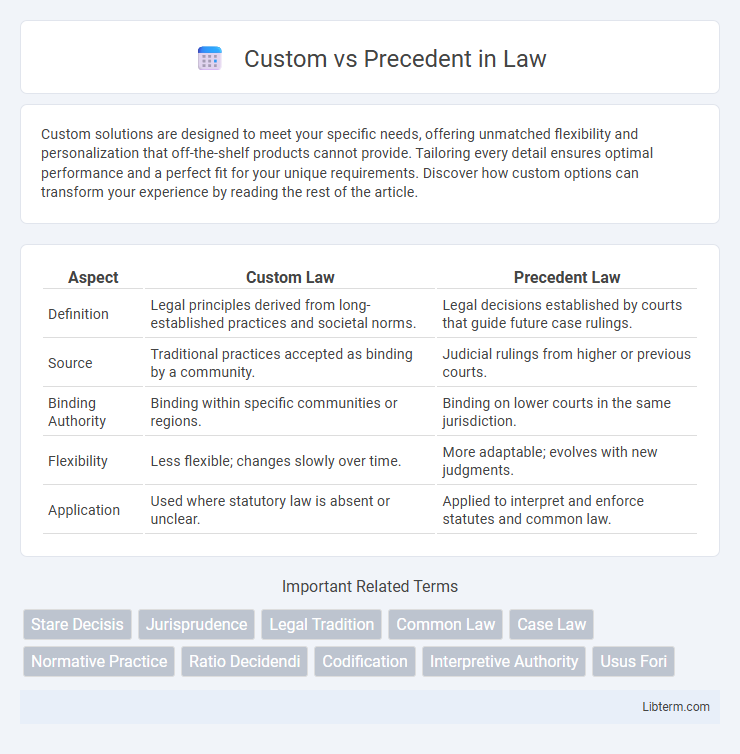Custom solutions are designed to meet your specific needs, offering unmatched flexibility and personalization that off-the-shelf products cannot provide. Tailoring every detail ensures optimal performance and a perfect fit for your unique requirements. Discover how custom options can transform your experience by reading the rest of the article.
Table of Comparison
| Aspect | Custom Law | Precedent Law |
|---|---|---|
| Definition | Legal principles derived from long-established practices and societal norms. | Legal decisions established by courts that guide future case rulings. |
| Source | Traditional practices accepted as binding by a community. | Judicial rulings from higher or previous courts. |
| Binding Authority | Binding within specific communities or regions. | Binding on lower courts in the same jurisdiction. |
| Flexibility | Less flexible; changes slowly over time. | More adaptable; evolves with new judgments. |
| Application | Used where statutory law is absent or unclear. | Applied to interpret and enforce statutes and common law. |
Introduction to Custom and Precedent
Custom refers to unwritten practices and norms established through consistent and long-standing usage within a particular community or legal system. Precedent, or stare decisis, involves judicial decisions from previous cases that serve as authoritative guidance for resolving similar legal issues. Both concepts play a crucial role in shaping common law by providing stability and predictability in the legal framework.
Defining Custom in Legal and Social Contexts
Custom in legal contexts refers to established practices and norms that gain binding authority through consistent and general usage over time within a community, serving as unwritten laws recognized by courts. In social contexts, custom encompasses habitual behaviors and traditional rituals that shape collective identity and social cohesion, reflecting the values and expectations of a particular group. Legal customs must be reasonable, certain, and continuously observed, differentiating them from arbitrary or infrequent social habits.
Understanding Legal Precedent
Legal precedent refers to past judicial decisions that guide courts in resolving similar future cases, ensuring consistency and predictability in the law. Custom involves long-established practices or societal norms that influence legal principles but lack formal judicial endorsement. Understanding precedent requires recognizing its binding authority in common law systems, contrasting with custom's persuasive but non-binding role.
Historical Development of Custom and Precedent
The historical development of custom as a source of law dates back to ancient societies where unwritten norms guided community behavior and were later codified into binding rules. Precedent, or case law, evolved prominently within common law systems, particularly in medieval England, where judges' decisions gradually established uniform legal principles through recorded rulings. Both custom and precedent reflect a dynamic interplay between longstanding societal practices and judicial interpretation, shaping modern legal frameworks.
Key Differences Between Custom and Precedent
Custom refers to established practices followed by a community or society over time, while precedent involves judicial decisions that guide future legal rulings. Customs are unwritten and emerge from habitual behavior, whereas precedents are formally recorded and applied within the legal system. The key difference lies in their authority: customs influence social norms broadly, while precedents carry binding legal weight in courts.
Advantages of Relying on Custom
Relying on custom offers the advantage of flexibility, allowing communities to adapt rules based on evolving social practices and cultural norms. Customary law promotes community cohesion by reflecting shared values and long-standing traditions, fostering a strong sense of identity and legitimacy. It provides practical solutions grounded in real-life experiences, ensuring that legal norms are responsive to the specific needs of the population.
Advantages of Following Precedent
Following precedent ensures consistency and predictability in legal decisions, which strengthens the rule of law and helps parties anticipate outcomes. It promotes judicial efficiency by reducing the need for courts to re-examine established legal principles repeatedly. Precedent also enhances fairness by applying the same standards to similar cases, fostering equality before the law.
Challenges and Limitations of Custom
Custom law faces significant challenges including its informal nature, making it difficult to consistently identify and apply across diverse communities. Variability in local customs creates limitations in predictability and uniformity, often leading to conflicts with established statutory laws. Moreover, the reliance on unwritten traditions hinders codification efforts, complicating legal interpretation and enforcement.
Issues and Criticisms of Precedent
Precedent faces criticism for its rigidity, often limiting judicial flexibility in adapting to societal changes and novel cases. It can perpetuate outdated or biased rulings, creating challenges in achieving justice and equity. Reliance on precedent may also lead to inconsistent application due to varying interpretations across jurisdictions.
Choosing Between Custom and Precedent: Practical Implications
Choosing between custom and precedent involves evaluating the flexibility needed versus the predictability offered by established decisions. Custom allows for tailored solutions that address specific contexts but may introduce uncertainty and require comprehensive justification. Precedent ensures consistency and efficiency by relying on past rulings, facilitating legal stability and reducing dispute resolution time.
Custom Infographic

 libterm.com
libterm.com